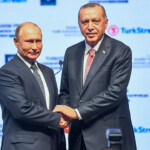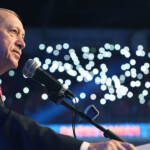‘The foundation for Sweden’s capitulation was laid at the NATO summit in Madrid. In a Trilateral Memorandum Finland and Sweden agreed not to provide support to FETÖ (Turkey’s acronym for what it calls the Fethullahist Terrorist Organisation) and the YPG/PYD. The YPG is the Kurdish militia that provides the backbone of the SDF (Syrian Democratic Forces) in Syria, which with the support of the U.S. and multinational forces in Operation Inherent Resolve has defeated ISIS. The PYD is its political wing.‘
The real victor at the NATO summit in Vilnius is not Ukraine, which received no immediate path to membership, but Turkey, whose president, Recep Tayyip Erdoǧan, got what he came for.
In the deal he struck with NATO’s secretary-general Jens Stoltenberg and Sweden’s prime minister Ulf Kristersson on the eve of the summit the devil lies in the details.
Turkey’s initial demand was for the extradition of 12 terror suspects from Finland and 21 from Sweden before it could agree to their membership of NATO. After the NATO summit in Madrid in June last year, the number ballooned to 73 from Sweden. After accepting Finland’s membership, Turkey’s focus turned to Sweden.
Turkey’s definition of terror is broad, and has come to include almost everyone who disagrees with its AKP (Justice and Development Party) government. The imprisonment of Selahattin Demirtaş, the co-chair of the Kurdish-based HDP (Peoples’ Democratic Party), and Osman Kavala, the civil rights activist, are notorious examples.
In the case of Sweden, the focus is on PKK (Kurdistan Workers’ Party) supporters and followers of Fethullah Gülen, the Turkish imam whose movement is accused of being behind the attempted coup in 2016.
An additional grievance is that a demonstrator was allowed to burn a Quran outside the Turkish embassy and later outside a Stockholm mosque. An effigy of Erdoǧan was also strung up outside Stockholm city hall.
The foundation for Sweden’s capitulation was laid at the NATO summit in Madrid. In a Trilateral Memorandum Finland and Sweden agreed to end their embargo on arms exports to Turkey, and in Article 4 not to provide support to FETÖ (Turkey’s acronym for what it calls the Fethullahist Terrorist Organisation) and the YPG/PYD.
The YPG is the Kurdish militia that provides the backbone of the SDF (Syrian Democratic Forces) in Syria, which with the support of the U.S. and multinational forces in Operation Inherent Resolve has defeated ISIS. The PYD is its political wing.
This was reiterated in the Bilateral Security Compact agreed between Sweden and Turkey in Vilnius. The gracenote was that Sweden also agreed to actively support Turkey’s EU accession process. The threat to Sweden’s membership is that it has until October to honour its commitment, when the Turkish parliament will be reconvened and able to ratify Sweden’s membership.
The fact that Sweden’s Supreme Court has rejected two of Turkey’s extradition requests does not augur well.
In return, the Biden administration has agreed to deliver 40 F-16 fighter jets and 79 modernization kits to Turkey.
However, by strengthening Turkey’s offensive capacity, the U.S. is undermining the commitment made in the Eastern Mediterranean Security and Energy Partnership Act, when it declared Greece to be a valuable NATO member, Israel a steadfast ally and Cyprus a key strategic partner.
The amendment to the MDCA (Mutual Defense and Cooperation Agreement) with Greece made in October, 2021 is also undermined.
As economic analyst Jesse Columbo predicted nine years ago, Turkey’s credit-driven economy is heading for a bust. As the Council on Foreign Relations has pointed out, the cupboard is bare.
Erdoǧan has completed a Gulf tour to Saudi Arabia, Qatar and the Emirates in the hope of investment and in September he will meet with the CEOs of some of the largest American companies with the same aim.
With Russia’s invasion of Ukraine there has been what German chancellor Olaf Scholz has termed a “zeitenwende,” a historic turning point, which has increased Turkey’s importance with regard to its strategic position in the region.
In May Vladimir Putin congratulated his “dear friend” Erdoǧan on his election victory and there has been a dramatic increase in Turkey’s trade with Russia. Russians also constitute the largest group of foreign homebuyers in Turkey.
Last Friday President Erdoǧan announced that Turkey is preparing to host Putin, when one of the items on the agenda will be an extension of the Black Sea grain deal. This emphasizes Turkey’s new role as “the honest broker,” as underlined by its refusal to impose sanctions on Russia for its invasion of Ukraine.
Consequently, the dilemma that particularly the U.S. faces is to persuade Turkey that its future, also economically, lies more with the West to avoid that it further deepens its dependence on Russia.
The views and opinions expressed above are the author’s and do not reflect those of the Free Turkish Press.


